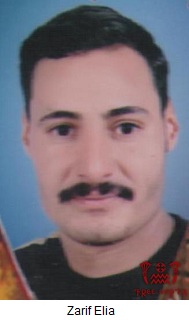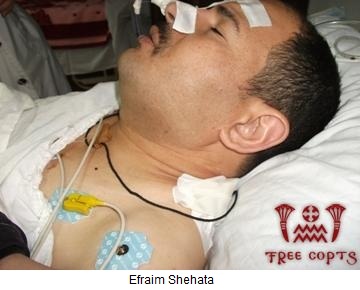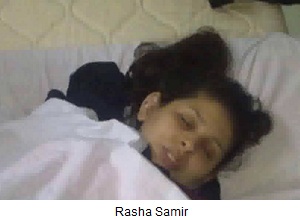

 (AINA) -- Fear has gripped the inhabitants of the upper Egyptian village of Sheikh Telada in Samalout, 250 kilometers south of Cairo, as they anticipate collective punishment against them by the village Muslims, in the wake of two sectarian incidents which took place in the village during February. They fear their fate would be similar to that of Farshout, Nag Hamadi and Bahgoura, where Muslims destroyed, burnt and looted Coptic homes and properties prompted by incidents provoked by Muslims against only one Copt.
(AINA) -- Fear has gripped the inhabitants of the upper Egyptian village of Sheikh Telada in Samalout, 250 kilometers south of Cairo, as they anticipate collective punishment against them by the village Muslims, in the wake of two sectarian incidents which took place in the village during February. They fear their fate would be similar to that of Farshout, Nag Hamadi and Bahgoura, where Muslims destroyed, burnt and looted Coptic homes and properties prompted by incidents provoked by Muslims against only one Copt.
State security forces have forced the Coptic villagers to remain indoors, and place a news blackout on the village. The presence of state security in the area is viewed with suspicion. Activist Mariam Ragy of the advocacy group Katibatibia sees in their presence "a way to keep Copts prisoners in their own homes and not for their own protection." Rafaat Samir of the Egyptian Union Human Rights Organization sees in it a slow death for the Coptic villagers. "Is the state security incapable of protecting the Copts so as to force them to remain indoors and abandon their work and schools?" asks Coptic activist Wagih Yacoub. "Is security so powerless every time the Copts are placed under siege by a mob imposing collective punishment on all village Copts?"
The first incident took place on February 2, 2010, when Coptic Zarif Elia and his wife were driving along the agricultural road, when they were followed by three men who stopped them and tried to rape his wife, after beating them both with batons. During the altercation, Zarif hit one of the perpetrators on the nose, and fled with his wife. A few hours later Zarif was accused of killing Basem Abul-Eid, one of the Muslim attackers.
Dr. Ihab Ramzy, Zarif's attorney, told activist Sherif Ramzy of Freecopts, that Abul-Eid's wounds were superficial and that he died of natural causes, which he assumes was caused by the excitement of the brawl and of chasing after Zarif and his wife. Zarif's wife was never interviewed by the police. In spite of the fact that Zarif was exercising his right of self defense, the dead Muslim's family believe that Zarif's family and the whole Coptic community should be held responsible for their relative's death.
Following this incident, Copt Ephraim Shehata from Telada gave an interview to Coptic activist Wagih Yacoub in which he warned of the seriousness of the situation in his village and appealed to human rights organizations to intervene to lift the siege of the villages Copts. The interview was aired on many Coptic sites and Paltalk rooms which are frequented by thousands of Egyptians, including the Egyptian state security monitors, who listen in to gauge Coptic sentiments on specific issues.
 A few days later, on February 27, as Efraim Shehata and his wife Rasha Samir were on their way to work they were ambushed on a side lane by a man who ordered them to get off their motorbike. The man threw Ephraim on the ground and hit his leg with the baton to immobilize him, then started firing at the couple with a cartouche hand gun, according Rasha. She went on saying that she threw herself over her husband to protect him, when they saw 4 or 5 men coming towards them, whom they mistook for rescuers.
A few days later, on February 27, as Efraim Shehata and his wife Rasha Samir were on their way to work they were ambushed on a side lane by a man who ordered them to get off their motorbike. The man threw Ephraim on the ground and hit his leg with the baton to immobilize him, then started firing at the couple with a cartouche hand gun, according Rasha. She went on saying that she threw herself over her husband to protect him, when they saw 4 or 5 men coming towards them, whom they mistook for rescuers.
The attackers assaulted the couple before shooting. "They were aiming at Ephraim's head, but the bullet went to his neck instead, besides the bullets to his side and abdomen." said Rasha, who was also shot several times." Ephraim underwent several surgical operations, however, shrapnels from the bullet which went into his neck lodged in his spine causing paralysis on his right side. The police arrested all five perpetrators.
"While being assaulted Ephraim was told that this attack was in revenge for having published on the internet the case of the Copt Zarif Elia from Telada," said Mariam Ragy who interviewed Ephraim in hospital. Many observers see the hand of the state security in the attack on Ephraim, to penalize him for breaking the news blackout and as a warning to others.
On March 1 State Security arrested Habib Benjamin, one of Ephraim's relatives, for venting his anger by criticizing the behavior of Muslims after the incident. Coptic activists expect a repeat of the security scenario of detaining more Copts in order to force the victims to give up their rights to get their relatives released.
 Wagih Yacoub is holding state security responsible for the present situation in Telada, especially because Ephraim had warned of the pending danger prior to being attacked. Yacoub sees evidence of systematic State persecution against the Copts. "Security agencies in all governorates are deliberately not protecting the Copts and in some cases even helping the extremists, by not penalizing them, and intervening only after they have finished burning and looting Coptic homes, as was the case recently in Farshout, Nag Hammadi and Bahgoura."
Wagih Yacoub is holding state security responsible for the present situation in Telada, especially because Ephraim had warned of the pending danger prior to being attacked. Yacoub sees evidence of systematic State persecution against the Copts. "Security agencies in all governorates are deliberately not protecting the Copts and in some cases even helping the extremists, by not penalizing them, and intervening only after they have finished burning and looting Coptic homes, as was the case recently in Farshout, Nag Hammadi and Bahgoura."
Reverend Stephanos Shehata, of Samalout Coptic Orthodox Diocese, told Katibatibia the situation of the Copts in Telada is quite dire, as they are frightened to leave their homes and are extremely distressed. Commenting on the arrests of the perpetrators he said that even if they are arrested, they will go free. "Any one of us is liable to get killed and the Muslims know they will be acquitted," he said.
"We are very disappointed. The problem is that we all know the perpetrators will be acquitted. We all know that state security will detain Copts -- then comes the bargaining between security and the victims, in which they are forced to relinquish their rights to get those detained out. The same story then starts all over again somewhere else."
By Mary Abdelmassih

or register to post a comment.